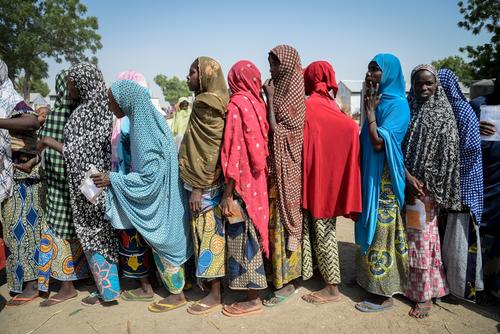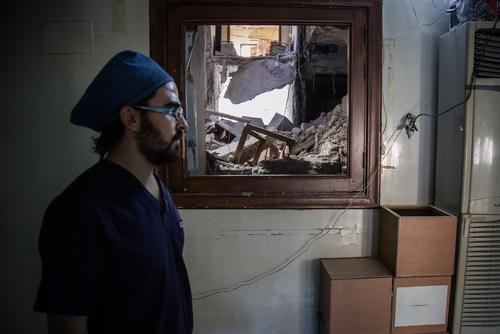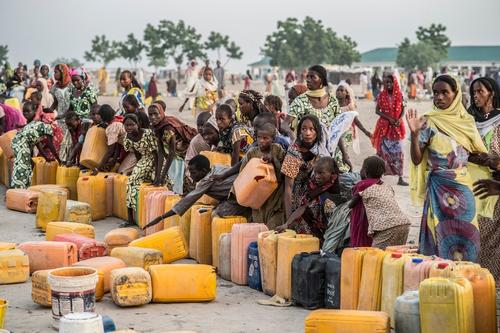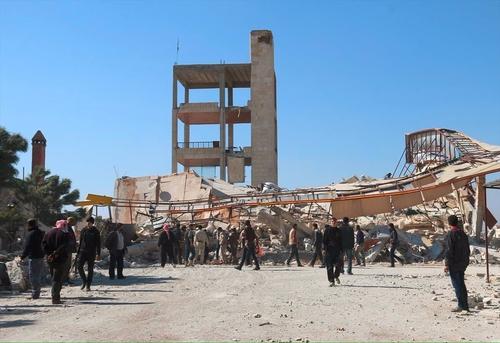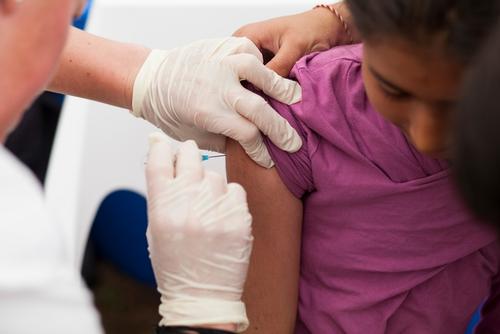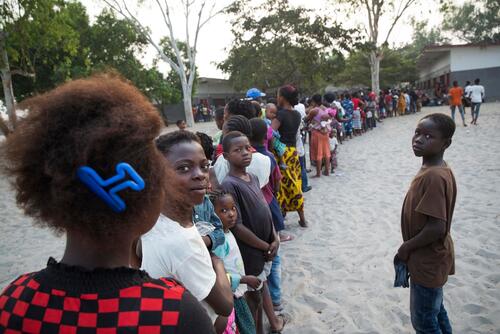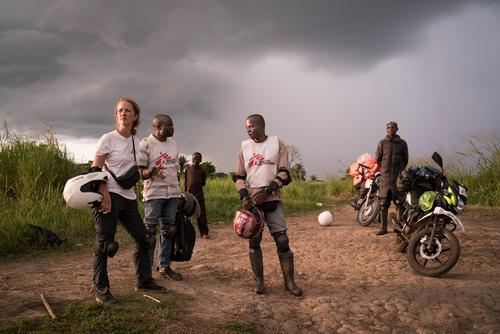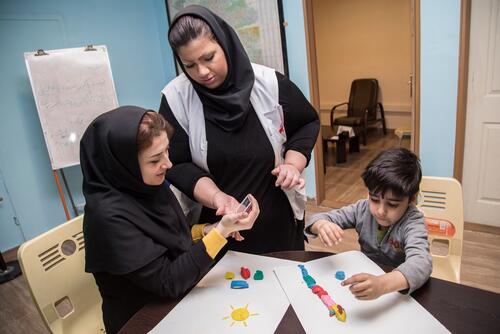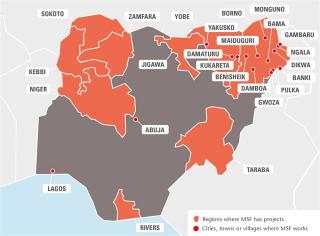
441,900
441,9
58,500
58,5
13,100
13,1

2,600
2,6
In 2016, the armed conflict resulted in a catastrophic humanitarian emergency in several areas of Borno state, with high mortality rates linked to severe malnutrition and preventable diseases. Although security within Maiduguri, the state capital, improved slightly, allowing for an increase in aid, active conflict, mass displacement and disease outbreaks continued outside the city.
Vital medical assistance in Borno state
From July, MSF started scaling up its emergency assistance in the region to reduce the high risk of death and disease among communities living in catastrophic conditions in several areas of Borno state. Insecurity restricted MSF presence significantly, and in some of the hardest hit villages teams could only carry out short visits with rapid interventions aiming to have the most impact in a short time frame. This included distributing food, therapeutic nutritional products and relief items, as well as running mass vaccination campaigns against measles, providing seasonal malaria chemoprophylaxis (SMC) and conducting medical consultations, and water and sanitation activities.
MSF scaled up its activities in camps for displaced people in Maiduguri and 10 nearby towns, running fixed clinics in the capital, Monguno, Damboa, Benisheik, Gwoza and Pulka, and deploying regular mobile clinics to the hard-to-reach towns of Bama, Dikwa, Banki, Ngala and Gambaru as soon as access was possible. During the year, a total of 20,760 children were admitted to therapeutic feeding centres, 290,222 outpatient and 2,764 emergency consultations were carried out and 3,071 patients were admitted for treatment. MSF conducted over 56,000 antenatal care consultations and assisted 5,181 deliveries
In the second half of the year, MSF delivered over 1,099 tons of food to displaced people and families with malnourished children. Teams vaccinated approximately 130,000 children against measles, 10,052 against pneumococcal pneumonia and provided 18,754 with SMC. To improve hygiene in the camps, MSF set up latrines, water tanks and taps, and provided petrol to power the water pumps.
MSF has provided healthcare to displaced people and host communities in Borno since mid-2014
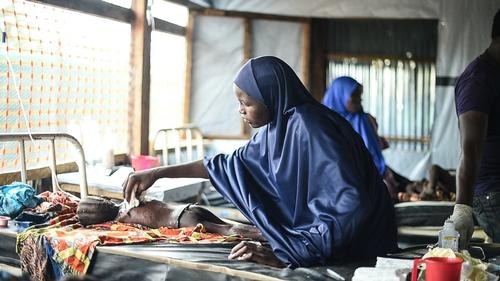
Maternal and child healthcare
At the health centre in Kukareta village in Yobe state, MSF offered reproductive and obstetric care, routine vaccinations and emergency assistance, and ran a 24-hour observation room. Complicated cases were referred to the hospital in Damaturu, the state capital, where MSF also operates a nutrition programme for children under the age of five. Teams conducted an SMC campaign in Kukareta and five other villages, reaching 3,717 children under the age of five.
In Jakusko LGA, in the western part of the state, MSF responded to an outbreak of measles, treating over 2,500 children and vaccinating 143,800 more between the ages of six months and 15 years. When a nutrition survey carried out at the same time indicated a prevalence of 8.9 per cent for severe acute malnutrition, MSF started working in four therapeutic feeding centres in the area, referring complicated cases to the MSF-supported stabilisation centre in Jakusko general hospital.
MSF has worked in Zamfara state since 2010, when there was an outbreak of lead poisoning in children. This year, MSF teams worked in five outreach clinics in Abare, Bagega, Dareta, Yargalma and Sumke, providing care for children under the age of five, and in the paediatric inpatient department of Anka general hospital, carrying out a total of 4,303 consultations
In Kebbe local government area of Sokoto state, MSF supported Kuchi primary healthcare centre in treating pregnant women and children under the age of five. By May, when the project closed due to insecurity, teams had conducted 5,868 outpatient paediatric consultations, including screenings for malnutrition, and admitted 179 children to the inpatient feeding centre. There were also antenatal and maternity consultations and admissions for pregnant women.
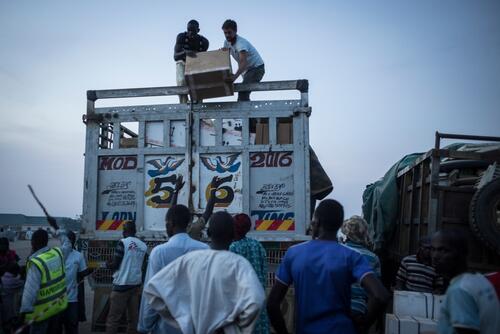
Responding to lead poisoning in Niger state
Following an outbreak of lead poisoning, MSF initiated an emergency remediation phase, then began screening and treatment activities in August. The safer mining pilot project opened in November and works with miners to reduce exposure to lead and off-site contamination in the communities following remediation. The team screened 218 people and enrolled 168 for treatment and follow-up. Since the start of the programme, 160 patients have been treated and discharged.
Reconstructive surgery for children
The MSF project in Sokoto continued to support specialised surgical care for patients with noma and other conditions and involved teams of international specialists. A total of 388 patients underwent surgery, 121 of them for noma.

Nigeria: Catastrophic Malnutrition in Borno State
Sexual and reproductive healthcare
Following an awareness campaign delivered through schools, health clinics, police stations and the media, monthly attendance at MSF’s programme for victims of sexual and gender-based violence in Port Harcourt, Rivers state increased from 35 to 70. The comprehensive healthcare package includes prophylaxis for HIV and sexually transmitted infections, vaccinations for tetanus and hepatitis B, emergency contraception, counselling and psychosocial support for victims of rape and sexual abuse.
MSF continued to run its vesico-vaginal fistula and emergency obstetric programme at Jahun general hospital in Jigawa State. This year, 70 per cent of the 10,531 women admitted to the maternity unit had complicated pregnancies and deliveries. The team performed 2,660 obstetrics-related surgical procedures, treated 400 women with fistulas, and assisted 7,365 births. A total of 1,293 babies and 1,141 women were admitted for intensive care. MSF also donated 8,228 units of blood to the hospital. In order to bring antenatal and obstetric care closer to patients and avoid pregnancy complications, basic emergency obstetric services were set up in Aujara and Miga health centres in September.
Responding to emergencies
MSF’s Nigeria Emergency Response Unit operates in the northern states of Sokoto, Kebbi, Zamfara and Niger. In Sokoto, in collaboration with the Ministry of Health and the World Health Organization, the team responded to a meningitis outbreak, treating 203 patients and vaccinating 113,030 people, an administrative coverage of 90 per cent. It also supported a measles intervention and treated 9,983 patients.
*Source: International Organization for Migration’s Displacement Tracking Matrix, 15 December 2016



